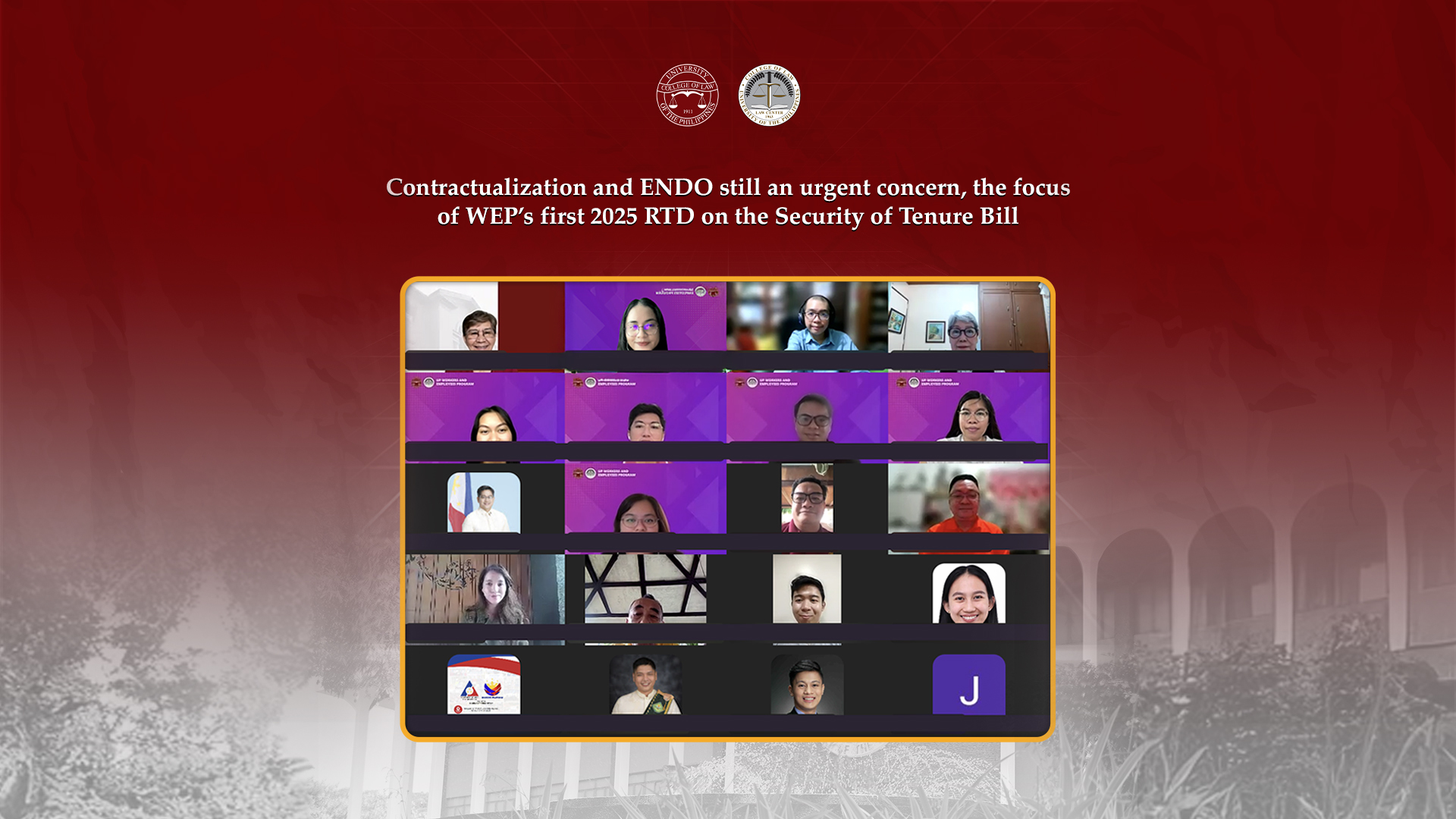Contractualization and ENDO still an urgent concern; the focus of WEP’s first 2025 RTD on the Security of Tenure Bill
Mindful of the urgent need to address contractualization and ENDO (end-of-contract) due to their impact on the constitutional and cardinal right of all workers to security of tenure, the University of the Philippines (UP) Law Center Workers and Employees Program (WEP) focused its first roundtable discussion (RTD) in 2025 on the Security of Tenure Bill. Held online on Saturday, 15 February 2025, the RTD was WEP’s 32nd since its inception in 2021, and still in line with the mission to pursue the constitutional mandate to afford full protection to workers and employees. The RTD focused on the pending bills in the Senate and the House of Representatives, proposing amendments to or replacements of Article 106 of the Labor Code on contracting and subcontracting, Article 294 [279] on Security of Tenure, and Article 295 [280] on Regular Employment.
In the welcome remarks, WEP Program Director Prof. Arnold de Vera noted the prevalent trend of contracting or outsourcing. Citing the Philippine Statistics Authority’s Highlights of the 2021/2022 Integrated Survey on Labor and Employment: Module on Employment: August 2022, Prof. de Vera noted that almost half of the total establishments relied on agency-hired or contracted workers. He further emphasized that this practice impacts fundamental labor rights, not just security of tenure, but also the right to a living wage, humane working conditions, self-organization, and collective bargaining.
Participants represented the following government and non-government organizations: the Department of Labor and Employment (DOLE) Legal Service, Center for Trade Union and Human Rights (CTUHR), All-UP Workers Union, Metal Workers Alliance of the Philippines, National Anti-Poverty Commission Policy and Planning Service (NAPC-PPS), and Bayan Muna Partylist.
During the RTD, the participants provided the following insights, positions, and comments:
Concerns Regarding Contractualization
- There is rampant contractualization not only in the private sector but also in the public sector
- A separate RTD is needed for security of tenure issues in government, such as workers under job order (JO) or contract of service (COS)
- Employers would hire workers for contracts shorter than the six-month probationary period to avoid regularization
- The term “seasonal” has been extended to non-agricultural work, particularly work in malls, to deny regular employment status
Possible Root Causes
- One cause relates to maximizing profit and decreasing expenses. In contractual arrangements, principals may lower wages despite the minimum wage law. Even then, the minimum wage in the Philippines has been noted to be unlivable, contrary to the constitutional mandate of a living wage.
- There is an inherent inequality between labor and capital. The employers have the majority, if not all the resources. The laborers only have themselves and their skills. There is a need for improvement so that there are laws that fulfill the mandate of the Constitution. Currently, workers have always been relegated to a lower position regarding the dynamics between employer and employee.
Total Ban on Contracting or Subcontracting
- Contracting or subcontracting must be totally banned
- Participants supported House Bills No. 1512 and 2173, as long as they proposed a total ban
- B. 1512: Establishes that contractualization is an unfair labor practice (ULP) subject to criminal prosecution
- B. 2173: Provides a more detailed list of prohibited contracting practices
- Both bills should be reconciled
- Independent filing of complaints against contractualization, similar to Section 6 (Independent Action for Damages) of Republic Act No. 7877 or the Anti-Sexual Harassment Act of 1995, should be included
- Janitorial, security, and clerical work should not be contracted out, since without them, a business cannot function
- Exceptions must be stated in the law and not left to the discretion of the DOLE Secretary or to the tripartite industrial peace council
Regularization
- All employees should be regular
- Project and seasonal employees should be allowed, but during the project or season, they must have all the rights and benefits of regular employees
- The term “seasonal” should be limited to agricultural work
- Seasonal employees must be given right of first refusal when offered regular employment
- Workers who are repeatedly hired through short contracts such as construction workers must be afforded the benefits of a regular employee
- This would be consistent with jurisprudence
Possible Framing for the Bill
- The explanatory note must emphasize that:
- Security of tenure is a cardinal right of all workers under the Constitution, hence all workers will benefit from the bill
- Corporate social responsibility requires ensuring that such a big workforce is not dissatisfied
- Businesses have their corporate responsibility, under the United Nations Guiding Principles on Business and Human Rights, to respect human rights
- This means that they should avoid infringing on the human rights of others and address adverse human rights impacts with which they are involved
- The responsibility of business enterprises to respect human rights refers to internationally recognized human rights – understood, at a minimum, as those expressed in the International Bill of Human Rights and the principles concerning fundamental rights set out in the International Labour Organization’s Declaration on Fundamental Principles and Rights at Work
Security of Tenure
- To be consistent with jurisprudence, the definition of “security of tenure” must include both procedural and substantive due process, and under substantive, both just and authorized causes.
Micro, Small, and Medium Enterprises (MSMEs)
- Mechanisms must be put in place to help MSMEs implement the bill, such as tax incentives, considering that MSMEs employ much of the workforce.
However, there is a need to fact-check just how many workers are employed by MSMEs compared to those employed by large enterprises, since the latter can afford to regularize workers under the proposed Security of Tenure bill.








































































































 on the upper right corner to select a video.
on the upper right corner to select a video.